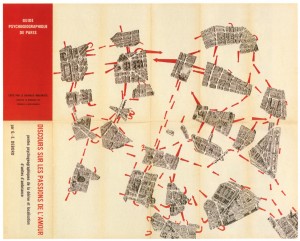I remember when I stopped reading the Metro. I was living in Coventry, in a new gentrification development dropped in the middle of some dodgier streets. Every day I took the bus to work and would flick through the Metro when I wasn’t in the mood for a book. One book I did read on the bus was Don Delillo’s White Noise; this was almost 20 years old at that point but seemed to do a better job of explaining the world than the free tabloid.
Christopher Watson’s first issue of Concrete Octopus is a very different thing to White Noise but it reminds me of it. Concrete Octopus’s first issue is devoted to Forced to Flee, an illustrated poem that responds to current media obsessions. While it doesn’t have the explicatory power of White Noise, it is a powerful response to the media. Watson built the poem as a collage of words from newspapers he found on his own commute. (“mainly The Times which I make a point of picking up(stealing) from the First Class section of the train(The Times is freely available to all First Class passengers), and The Metro(which is free to all)”)
By pulling out the words and notions that demand our attention and breaking them up against each other, this long poem questions the media it parasitises. Meaning is withheld in Forced to Flee; whereas the newspaper articles about Syria, ISIS and the ongoing conflict offer a meaning they don’t have. That makes it sound a less engaging than it is – Watson’s own description of the poem is:
“a fragmented feature-length pulp-modernist exploration of the mediascape. It is a mechanical poem which focuses on the narrative of refugeeism embedded in our third-hand experience of the Western imperialist ever-war. Sounds like a laugh? You bet”
But the poem does contain amusing moments and the illustrations are fantastic. Watson is a talented graffiti artist and has made the pictures without the use of Photoshop. Even if the poem doesn’t sound like your thing, you should check out the images. Forced to Flee may not stop the ‘ever-war’, but it’s changed my response to it, and the mediated spectacle that I’m being offered.
Concrete Octopus #1 is an edition of 200. You can pick up a copy at Christian’s readings or Bookbuster in Hastings, East Sussex. There will probably be copies for sale via ebay soon but, if all else fails, email Lurchingadams25@hotmail.com. There are plans for follow-ups which will branch out and involve collaborators.

























































